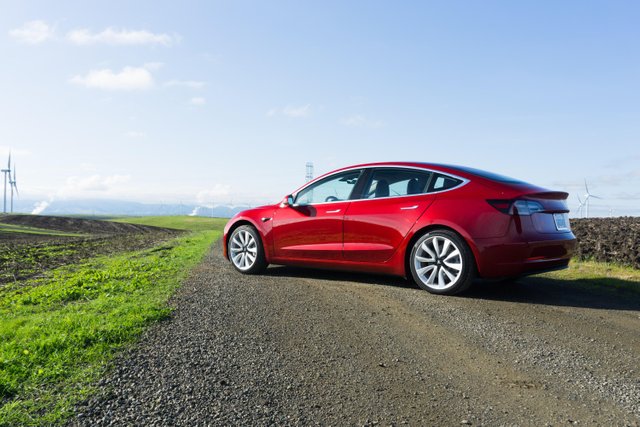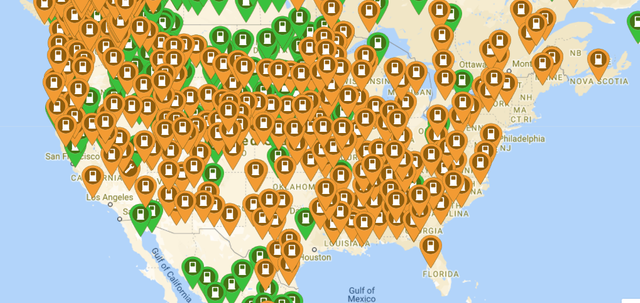Hydrogen Fuel Cell Vs. Battery Electric: A Complete Comparison

In the past several years, electric vehicles (EV's) have taken off. Their sales well surpassed 1 million units for the first time, and captured about a 1.3% market share of vehicles worldwide.
Hydrogen fuel cell vehicles have a different story. They sold just a few thousand units worldwide, and represented a negligible market share. However, hydrogen fuel cell has long been thought of as the future of vehicles. A recent survey of vehicle executives shows the majority of them still believe it is.
So what gives? Which technology is better, and what are the factors playing for or against each? Why has on technology been relatively stagnant, and the other taken off? Let's explore them.
Range
Range has long been thought of as the Achilles heel of electric vehicles; many of the first electric vehicles didn't even near 200 kilometers of range on a full battery. This has often been cited as a major advantage of hydrogen vehicles, they can produces ranges comparable to gas cars.
However, the evolving electric vehicle market has quickly come to challenge this. Battery technology is fast improving, and range has come with it. So let's look at some numbers. There are currently 5 hydrogen fuel cell vehicles with "production" versions, although many have very limited availability.
Fuel Cell Vehicle Ranges
| Vehicle | Range In km (EPA Rated) |
|---|---|
| Honda Clarity | 589 |
| Mercedes F-Cell | 402 |
| Hyundai ix35 | 594 |
| Toyota Mirai | 502 |
| Hyundai Nexco | 595 |
| Average | 536 |
Those ranges look, on the surface, to be pretty respectable, and are in fact roughly comparable to gas car ranges. But how do they stack up against modern electric vehicles? I can't list out all the electric vehicles, it would take forever. Instead, I used the top 5 selling electric vehicles in America so far this year.
Electric Vehicle Ranges
| Vehicle | Range In km (EPA Rated) |
|---|---|
| Tesla Model 3 | 500 |
| Tesla Model S | 417 - 539 |
| Tesla Model X | 381-475 |
| Chevrolet Bolt | 383 |
| Nissan Leaf | 243 |
| Average | 406 |
So fuel cell vehicles do have a range advantage, but it's not as much as you would think, and not nearly as much as it used to be.
Even then, a pertinent question exists; will that advantage persist? Hydrogen fuel cell ranges aren't likely to increase much further, since the energy density of hydrogen is more or less fixed. Electric vehicle ranges, on the other hand, have ranges that are still fast improving. Automakers have plans to bring an array of EV's with 500+ kilometer ranges, including a BMW with 700 kilometers of range and a Tesla Roadster slated to have 1,000 kilometers of range.

Fueling Times
This, however, is often cited as the primary advantage of a fuel cell vehicle. A fuel cell vehicle can be filled in about 10 minutes. Electric vehicles, however, are a bit more complicated.
EV's have a wide array of charging options. Charging times will also depend on the battery size, which varies from vehicle to vehicle. Typically, a car will take several hours to charge at home or by Level 2 charger. For times for charging time is sensitive (like road trips), fast chargers take their place. Tesla has the famous Supercharger Network. A Tesla is able to get an 80% charge in about 45 minutes at a Supercharger. Other cars fast charge at a slower rate, and can take a little bit longer.
Fuel cells do have a clear advantage here; but for how long?
Electric vehicle charging is evolving. Currently, the fastest charging car available is Tesla, which can accept 120 kW. The upcoming Audi etron quattro, arriving in a few months, will be able to accept 150 kW. However, things will get interesting in 2019. The Porsche Mission E (pictured above) can accept 350 kW, which will equate to a charge in about 15 minutes. Many vehicles are expected to follow afterwards, and 350 kW charging stations are going up by the hundreds in preparation for them.
If this follows as expected, then 15 minute charging should be widely available to electric vehicle users in the near future. So for now, the edge here goes to fuel cell vehicles, for now. How long that edge will last is very debatable.
Fueling Availability
Here, fuel cell viability begins to break down. Electric vehicles can be charged - albeit slowly - from any outlet. So "fuel" is universally available. Hydrogen, on the other hand, is available only at public fueling stations. Here is a map of fueling stations in the US

Source: The Department of Energy
There are 33 public stations in the entire country, all of which are located in California. So for 90% of America, owning a hydrogen fuel cell vehicle is impossible. Even if you live in California, the nearest station might be two hours away. And you better not plan on travelling anywhere outside of California, ever. Now, they are building more - very slowly. A small few stations usually come online every year. But when you consider there are 115,000 public gas stations, hydrogen has a long way to go.
Building out that infrastructure is no small task. It will likely require trillions of dollars of infrastructure, mainly from the private sector that has looked almost completely uninterested in picking up the bill. Until there are way more hydrogen vehicles out there, we are unlikely to see much movement here.
Electric vehicle charging stations areslightly more available:

Source: PlugShare
There are over 48,000 charging stations in the US as of 3 months ago, although this number is likely a little higher now. This includes about 2,300 fast charging stations. Of course, most EV drivers charge at home, but these are the stations additionally available to the public. Electric vehicles run away with this category by a mile.
Fuel Costs
Hydrogen hits another hitch here - it isn't cheap. And for good reason; the process involves taking electricity, turning it into hydrogen, transporting it to the fueling station, an then turning it back into electricity in the car is a a comparatively inefficient process. Hydrogen prices may come down as scale is achieved, but they will never meet electricity.
Fuel cost for hydrogen vehicles vary, but we do have some numbers. A Hyundai Tucson would cost about $1,700 a year to fuel. A Toyota Mirai, which is smaller and more efficient, would be cheaper; just $1,250 a year. The average of the two is $1,475.
An average average electric vehicle costs about $540 a year to charge. Hydrogen loses here - being two to three times more expensive to fuel.
Convenience
Lastly, we have convenience. Electric vehicles have the ability to charge almost anywhere - at home, work, or public chargers. Electric vehicle owners often cite a perk of owning an EV as not having to stop to gas up. Hydrogen doesn't have this, nor do they have readily available fueling stations anyways.
Conclusion
Fuel cell vehicles do have some small advantages over current electric vehicles - but those advantages appear to be temporary.
The advantages of electric vehicles, on the other hand, seem more inherent. Hydrogen is a long way from being even possible from most people. Fuel cell vehicles eliminate all gas savings, replacing them with an equally expensive alternative.
With this in mind, I believe the technological advances will mean the battery electric vehicle is far more likely to prevail than the hydrogen fuel cell vehicle.
Congratulations @raptorman! You have completed some achievement on Steemit and have been rewarded with new badge(s) :
Click on any badge to view your own Board of Honor on SteemitBoard.
To support your work, I also upvoted your post!
For more information about SteemitBoard, click here
If you no longer want to receive notifications, reply to this comment with the word
STOP